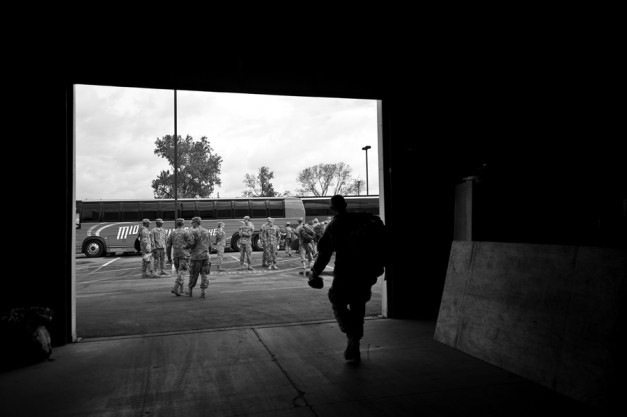News
Colleges take new look at ROTC after change in LGBT policy
A Gateway Battalion cadet exits the North Campus garage to board a bus to Fort Leonard Wood for the fall field training exercise. With the repeal of Don’t Ask Don’t Tell, LGBT cadets will now be allowed to serve openly.
Following the repeal, Harvard University and Yale University both announced that they are interested in reinstating ROTC programs on their campuses.
Columbia University appointed a student-faculty taskforce to take the first steps in deciding whether to permit ROTC back on campus, and Stanford University is also discussing the possible return of ROTC.
ROTC is a college-based officer commissioning program that was banned four decades ago at these universities amid protest of the Vietnam War.
Although Washington University has had an ROTC program for more than 90 years, the presence of military recruiters on campus has come under fire because the military’s treatment of gays and lesbians does not align with the University’s non-discrimination policies.
But because of the Solomon Act—a 1995 law that permits Congress to cut federal funding from any university that prohibits recruiters on campus—the University continues to allow recruitment on school grounds.
The Solomon Act was passed in response to many schools’ refusals to allow military recruiters on campus after the 1993 enactment of “don’t ask, don’t tell” under the Clinton Administration.
The School of Law prohibited recruiters until 2000, until an amendment to the Solomon Act was passed stating that the government would deny funding to an entire university even if just one school within that university refused to allow recruiters.
The law school could afford such a stance because it received nominal funding from the federal government compared to other schools.
The reintroduction of military recruiters at the law school was met with student protest.
David Dresner, who graduated from the University in 2010, spearheaded efforts last year to get the Olin Business School to send out letters to students notifying them of the military’s “don’t ask, don’t tell” policy and stating that the University does not condone such discrimination.
The law school already had a similar practice in place to inform students about military recruiters on campus.
Dresner said he was overwhelmed when he heard that “don’t ask, don’t tell” was repealed.
“It was a really special moment,” Dresner said. “My straight friends and gay friends were excited, overjoyed; we felt that this was the beginning to quickly reform laws.”
Mark Brostoff, director of the business school’s Weston Career Center, said that the repeal of “don’t ask, don’t tell” could lead to more opportunities for the military to recruit on campus.
Brostoff served in the U.S. Navy for 20 years and is now an openly gay man who speaks on college campuses about LGBT issues in the workplace.
“The opportunities in the armed forces for professional employment are very good, and it is an excellent way to start a career,” Brostoff said.
Brostoff said he never displayed military recruitment material around the business school before the law’s repeal. But now that the military has changed its discriminatory policy, he said he plans to do so.
“The recruiters that come in for military recruitment deserve an equal opportunity to compete for our students,” Brostoff said.
Mark Smith, director of the Career Center, applauded the law’s repeal, but said that he does not expect to see a significant increase in the small number of students who opt to join the military after college.
The Gateway Battalion program—a ROTC program hosted by the University that includes cadets from 10 other St. Louis colleges—currently enrolls 21 students from the Danforth Campus. The program has had consistent enrollment numbers in past years.
“Wash. U.’s Gateway Battalion is a model on how an elite school can effectively partner with an on-campus ROTC unit,” Lieutenant Colonel James Craig, commander of Gateway Battalion, wrote in an e-mail to Student Life. “We get great support from the administration, and the students who chose to join Gateway ROTC are consistently among the very best cadets in the country.”
While students celebrated the law’s repeal, many acknowledged that this is just one step in the road to full equality for America’s LGBT community.
“I don’t know if it will change the system as a whole or the environment within the military, but we’re on our way,” said junior Alex Terrano, president of Pride Alliance. “Everyone [in Pride Alliance] is really happy about it. This is a milestone in the LGBT movement.”

